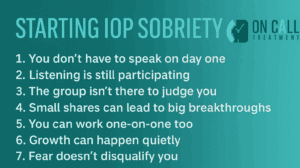If the idea of speaking in front of strangers makes your stomach tighten, you’re not alone.
Many high-functioning people—those who have kept careers, family roles, and public appearances intact despite heavy drinking or drug use—find the thought of group therapy more intimidating than sobriety itself. It’s not always about the content. Sometimes it’s about the risk of being seen, the possibility of losing the controlled image you’ve worked so hard to maintain.
At On Call Treatment’s intensive outpatient program in Waltham, MA, we see this fear often. And we know it’s not a flaw. It’s a sign that you’ve been in self-protection mode for a long time—maybe years. The good news? You can still benefit from IOP without turning into an open book on your first day.
You Don’t Have to Speak on Day One
One of the biggest myths about group therapy is that you’ll be put on the spot immediately. In reality, seasoned facilitators understand that trust takes time. No one’s going to ask you to unload your life story in the first hour.
You can come to IOP, take a seat, and simply listen at first. Sometimes, just being in the room and hearing other people’s stories starts to shift something inside you. Showing up is already part of the work.
Listening Is Still Participating
Even without speaking, you’re still an active part of the group. Listening to others share their experiences—especially when they echo your own hidden struggles—can be a powerful reminder that you’re not alone.
Many clients have told us their biggest breakthroughs happened while sitting quietly, realizing they weren’t the only ones who felt shame, fear, or exhaustion. That realization alone can plant the seed for change.
The Group Isn’t There to Judge You
In an intensive outpatient program, you’re surrounded by people who understand what it means to struggle. They’re not there to critique your story or your delivery. Everyone is there because life has been harder than they could manage alone.
High-functioning people often assume others will be analyzing them. In reality, most group members are too busy wrestling with their own recovery to judge anyone else. And when you do speak, you may find people listen more closely, simply because they know you’ve chosen your words carefully.
Small Shares Can Lead to Big Breakthroughs
You don’t need to reveal everything at once. You might start with something small—a sentence about how your week went, a reaction to what someone else said, or a single detail about a challenge you’re facing.
These small steps build trust with the group and, more importantly, with yourself. Over time, you may find you’re ready to share more—not because you feel pressured, but because you feel safer.
You Can Work One-on-One Too
Group therapy is a core part of IOP, but it’s not the only part. Most intensive outpatient programs also include individual counseling. This is your private space to process deeper issues, talk through trauma, or rehearse what you might want to share with the group.
This layered approach means you can pace yourself. You don’t have to choose between total silence and full exposure. You can bring things into the light in stages.
Growth Can Happen Quietly
Not every breakthrough is dramatic. Some of the most important changes happen inside, in ways that aren’t visible to anyone else.
You might notice you’re starting to see patterns in your thinking. You might catch yourself reaching for a coping strategy instead of a drink. You might begin to imagine a different kind of life. These are the signs of recovery, even if they happen without a single group monologue.
Fear Doesn’t Disqualify You
Being scared to open up isn’t a reason to avoid treatment. In fact, it’s often a reason to start. If you’ve been holding everything in for years, it’s unrealistic to expect yourself to flip a switch and start pouring it out.
Recovery is about learning to live differently, not performing bravery. You can walk into IOP with fear in your pocket and still walk out with progress in your hands.

Why High-Functioning People Struggle with Group
If you’ve been high-functioning while drinking or using, you’ve probably spent years perfecting the art of concealment. You’ve learned how to meet deadlines hungover, how to avoid questions at family events, how to show up looking fine when you’re anything but.
That skill—hiding—has been your armor. And armor isn’t easy to take off, even in a safe place. But IOP gives you a setting where you can experiment with setting it down, piece by piece, without anyone forcing your hand.
The Long-Term Payoff of Staying
Many people who start IOP with the intention of “just listening” end up speaking more as the weeks go on. The safety builds. Trust grows. And sometimes, that one moment of sharing something real becomes a turning point—not just in group, but in your entire recovery.
Even if you never become the most talkative person in the room, you’ll still leave with tools, insights, and connections that make staying sober in daily life more possible.
Call (833)287-7223 to learn more about our Intensive Outpatient Program services in Waltham, MA.
Frequently Asked Questions About Intensive Outpatient Programs
1. What is an Intensive Outpatient Program (IOP)?
An IOP is a treatment option that provides structured therapy—usually several days a week—without requiring you to live at a facility. It typically combines group sessions, individual counseling, and skill-building workshops.
2. Do I have to talk in group therapy to benefit from IOP?
No. While sharing can be valuable, you can still benefit by listening, reflecting, and participating in ways that feel safe to you.
3. What if I never feel ready to open up?
That’s okay. Many people use individual sessions to process personal topics, and not everything has to be shared in group. The goal is progress, not forced vulnerability.
4. Is IOP right for introverts or people with social anxiety?
Yes. IOP can actually be a gentle way to practice being around others in a supportive setting. Facilitators are trained to help you engage at your own pace.
5. How long does IOP last?
Most programs run for 8–12 weeks, but length can vary. Some people extend their time for ongoing support, while others step down to less intensive care.
6. What’s the benefit of group therapy if I’m not talking?
Listening to others can normalize your experience, give you new coping ideas, and reduce feelings of isolation—even without speaking.
7. How do I start IOP if I’m nervous about group?
You can let the admissions team know about your concerns. They can help you plan your first sessions so you feel comfortable, and they’ll never force you to share before you’re ready.

